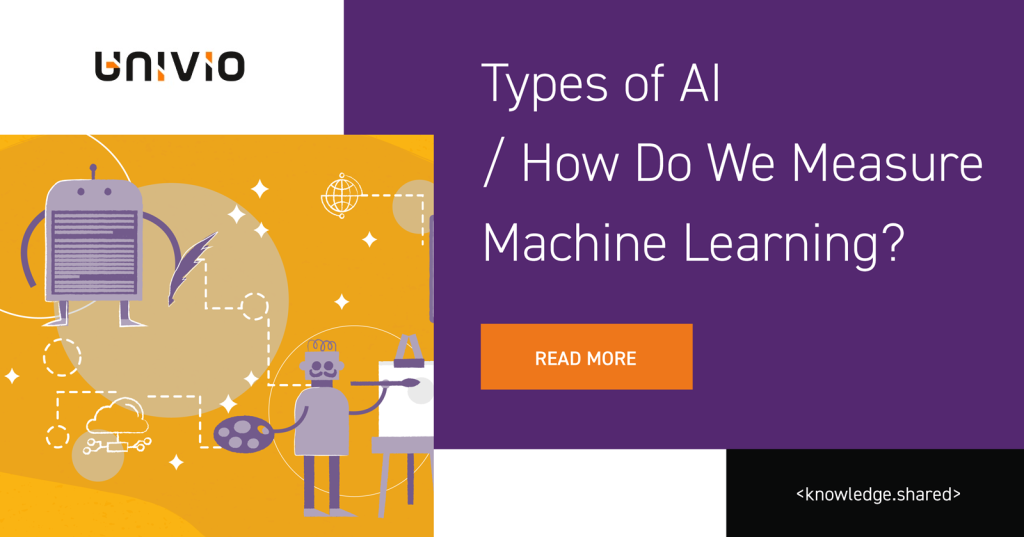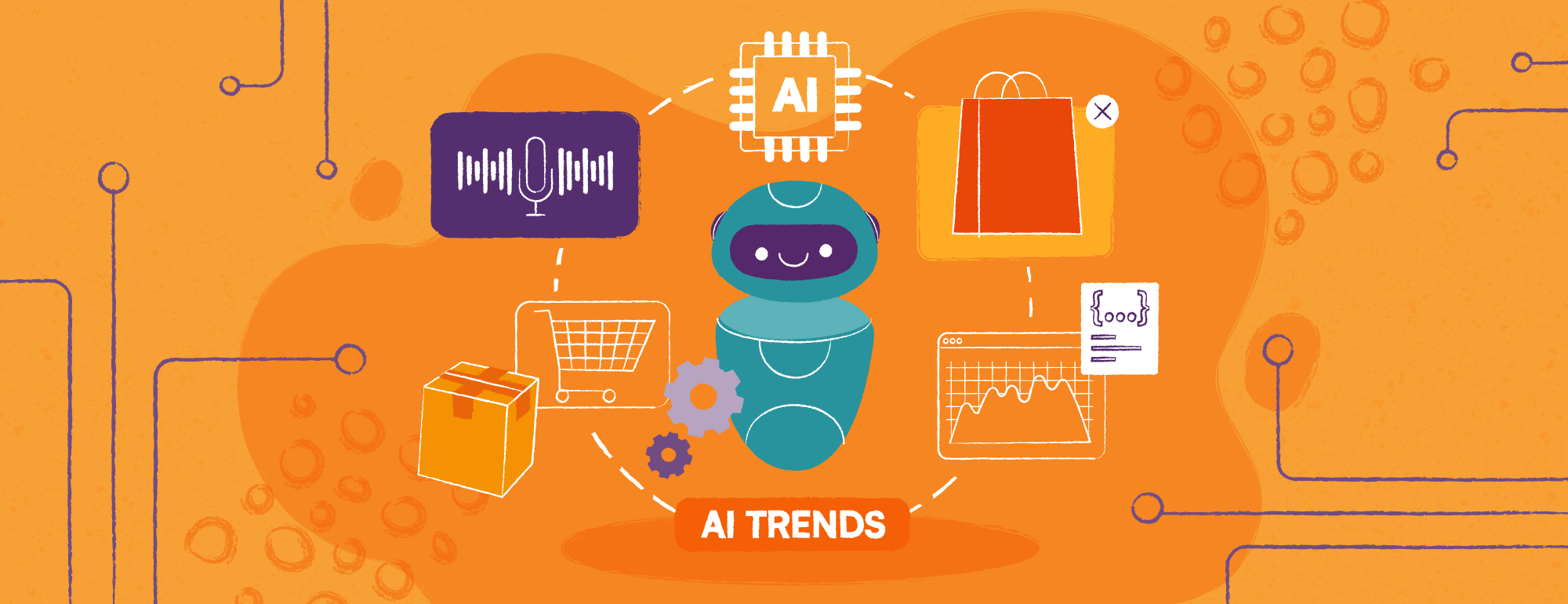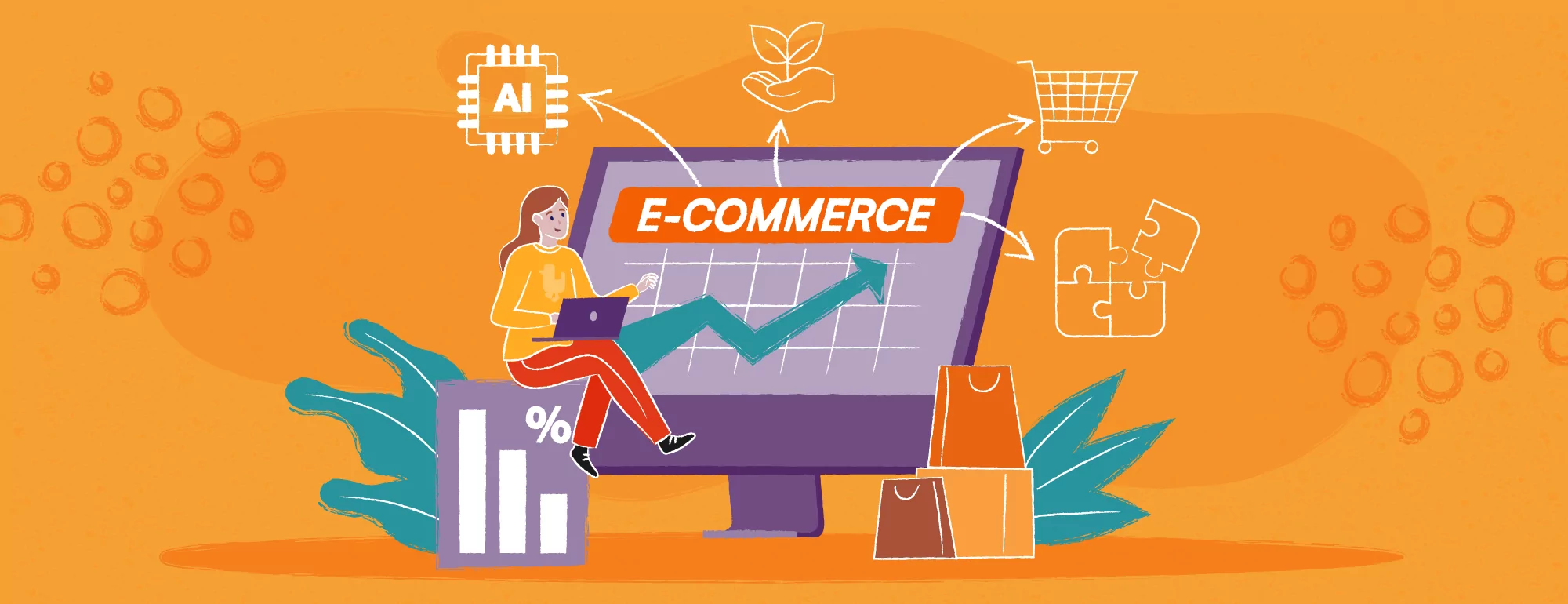Data & AI Trends / Predicting Artificial Intelligence in 2024
If you haven’t read about AI at some point this year, you’d have to be a hermit, living in a cave… on another planet. ChatGPT alone filled up half of our LinkedIn feeds, but the future of Generative AI is far from the only new AI technology 2024 has on the horizon for us…
We previously covered the most important 2024 e-commerce trends, and it was hard not to make every point an “AI-driven thingamabob.” Let’s take a closer look at the landscape of artificial intelligence and what we can expect from it in 2024.

Natural Language Processing
If the majority of AI systems being developed are designed to enable humans to better do things, understanding the way humans speak is an essential part of that progress. Understandably, Natural Language Processing (NLP) isn’t exactly one of the latest trends in AI, but it is one of the key landmarks in the AI landscape.
As we see AI chatbots, shopping assistants and more come to the fore, the push to enable those tools will inevitably lead to an overall increase in the quality of NLP. It’s a cycle that will continue: AI solutions will create demand for better and better NLP, and NLP (together with Large Language Models) will enable wider and larger AI opportunities.
AI-Powered Customer Service
In our previous e-commerce trends roundup, we spoke about Zalando’s digital assistant, using AI to recommend clothing to customers with a degree of personalization. We fully expect this one to continue.
Where companies like Zalando lead the way, others will follow. From there, it becomes a small arms race to ensure the best results. AI customer service is more than just about efficiently answering queries without human input.
As the fashion sector is discovering, it’s a brand new channel in its own right; shoppers will come for the advice, and may end up buying something in the process, if the AI is up to the challenge.
Data-Driven Commerce
Okay, so being “data-driven” doesn’t sound like a trend, we know. It’s something that people should be doing in general. However, the reason we’re including it is that it’s simply becoming more and more viable to make data-driven decisions in the e-commerce sector.
Today, we can analyse not only simple e-commerce metrics, but also deeper insights generated through AI and automated data tools. These solutions can process the results quicker than humans can, enabling companies in the likes of e-commerce and retail to make decisions fast enough to actually matter.
As data trends go, it’s one of the most obvious ones, but it’s important. Companies have access to all the data. 2024 is the time to use it.
API-Driven Integration
API and Data go together like an obvious metaphor and a popular American sandwich. Data is collected anywhere and everywhere something happens, so companies often face the challenge of simply collecting it in the first place.
Behind all great trends in AI, there needs to be a data collection process. AI needs data to learn from, and API serves that role beautifully. It enables data to be collected once, stored in a single source of truth and them utilized by whichever solutions or bots need it.
And when implemented business-wide, that leads to…
Data-Fabric Approach
In short, the data-fabric approach involves the implementation of data collection and ETL/ELT processes at a key integration layer of the architecture. This then stores the data in the required data repositories as needed, which analytics and other applications than access.

At a base level, it’s the same as single source of truth but, looking deeper, it’s a holistic approach to collecting data from all corners and implementing architecture around this very process. It looks to fully automate data management processes and democratize it, making it fully accessible for every team that needs it, without necessitating technical skill.
The Generative AI Trends Speed Round
One of the biggest data trends of 2023 was arguably Generative AI, and it looks like this will only grow in 2024. So, rather than simply shouting “ChatGPT” and calling it a day, let’s break one of the biggest trends in AI down into its more specific use cases…
Marketing
Broadly speaking, Marketing requires a lot of content to be generated and produced. We’re seeing more and more companies implement Generative AI to create product descriptions, implement real-time updates and enable their support in content creation and strategy.
In some areas, Gen AI is also being used to generate images. This can be a powerful tool for the likes of social media teams, but less impactful for the likes of fashion or furniture companies, which still need to show real, accurate photographs of their products.
Will it take over in 2024? Probably not. Gen AI is not perfect, and right now serves as a powerful time-saving tool and creativity booster, but it shouldn’t be running without human handlers. Otherwise you end up publishing travel guides that recommend foodbanks as tourism destinations.
Sales
As tools for parsing data, Generative AI can really help sales processes. It can analyze company or individual profiles to create or tailor communications, helping sales teams to make better connections. Implemented fully, perhaps it can even adapt materials, such as presentations, to individual customer needs, creating dedicated materials for every client about their specific needs.
It can also summarize customer feedback and reviews to better find potential improvements in the business, whether that’s customer service, the product itself or something else entirely. Combined with NLP, sentiment analysis will play a huge role for AI-enabled sales teams. Such solutions can determine the emotional tone of human responses (so let’s hope the other team isn’t also using AI 😉 ) to better read into situations.
Software Engineering
Code and content are very similar… at least from the perspective of AI. There are a lot of shortcuts and repeated elements that generative AI can help with. There are already a number of tools, such as Co-Pilot, designed to help developers focus on coding the unique parts of software, rather than the boilerplate elements.
In other words, Generative AI is serving alongside frameworks and libraries in helping developers maximize their time on unique elements. This leads to faster development processes and higher product quality so, yes, we fully expect this AI trend to continue!
And Now You’re Up to Data
This list is not exhaustive. There are so many AI trends out there right now, that would be talking about them for weeks. But we wanted to focus on the latest trends in AI that have the biggest appeal to business.
At a smaller level, these AI and data trends will have different levels of appeal. But all businesses need data for business, or can use AI to deal with customers and clients. And if all else fails, we can readily predict a future of generative AI in your business 😉









